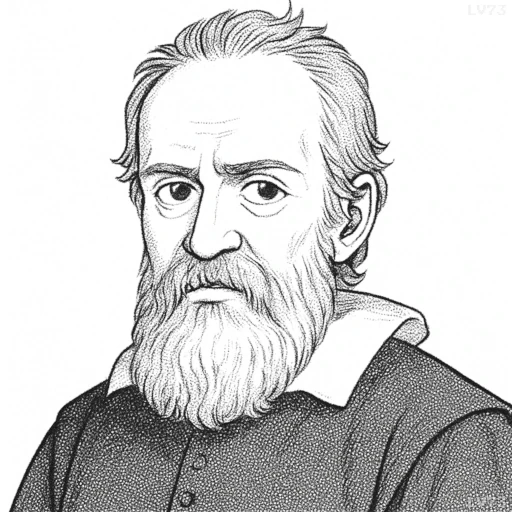“He who looks the higher is the more highly distinguished, and turning over the great book of nature (which is the proper object of philosophy) is the way to elevate one’s gaze.”

- February 1564 – January 8, 1642
- From the Duchy of Florence (Italy)
- Physicist, astronomer, mathematician
table of contents
Quote
“He who looks the higher is the more highly distinguished, and turning over the great book of nature (which is the proper object of philosophy) is the way to elevate one’s gaze.”
Explanation
In this quote, Galileo underscores the idea that true intellectual and philosophical greatness comes from striving to understand the natural world—what he refers to as the “great book of nature.” For Galileo, the pursuit of knowledge through scientific inquiry was not only a means to understand the physical universe but also a path to elevate the mind. By looking toward the “higher”—the heavens, the stars, and the underlying principles of nature—one could rise above mundane concerns and engage in a more noble pursuit of knowledge. This notion reflects his deep conviction that philosophy and science are the highest forms of intellectual endeavor, as they lead to a better understanding of the cosmos and humanity’s place within it.
This idea remains relevant today as we continue to push the boundaries of scientific discovery. From the study of space exploration to the exploration of the microscopic world, the pursuit of higher knowledge—understanding the vast complexities of nature—remains a fundamental human drive. In modern philosophy, there is still a belief that the natural world holds key insights into the mysteries of existence, ethics, and human purpose. For instance, fields like astrophysics and quantum mechanics continue to challenge our perceptions of reality, pushing us to look beyond the visible and question the very fabric of the universe. Galileo’s perspective encourages us to elevate our gaze and seek knowledge that transcends immediate, everyday concerns.
Galileo also suggests that philosophy is not merely an abstract pursuit but one that is deeply connected to the physical world. In his time, the study of nature was often seen as a philosophical endeavor—the quest for wisdom through the observation of natural phenomena. Today, this idea is reflected in interdisciplinary fields that blend science and philosophy, such as philosophy of science or ethics in technology. Galileo’s call to turn over the “great book of nature” is a reminder that understanding the laws of nature can lead to moral and intellectual enlightenment, encouraging us to look beyond ourselves to the broader, interconnected universe. By engaging deeply with the natural world, we not only elevate our minds but also gain a profound sense of our place in the cosmos.
Would you like to share your impressions or related stories about this quote in the comments section?
